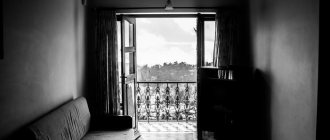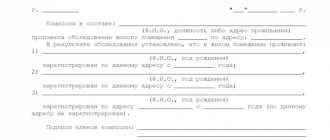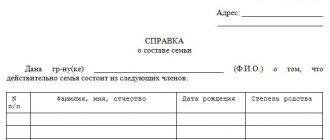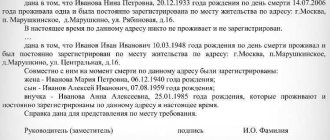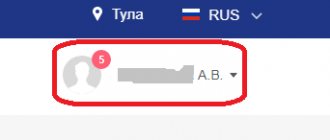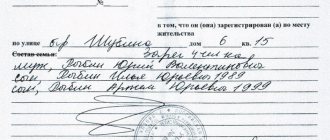If your question is lengthy and it is better to ask it in writing, then at the end of the article there is a special form where you can write it and we will forward your question to a lawyer specializing specifically in your problem. Write! We will help solve your legal problem.
When drawing up an act, it is necessary to comply with the norms of the current legislation, only in this case the document will be accepted for consideration.
When drawing up an act of residence at a different address, a specially created commission must be present.
Please note! The commission includes:
- district police officer;
- neighbours;
- representative of the management company;
- interested people.
It is not prohibited for private individuals to draw up an act: neighbors, the owner of a residential premises, or a landlord.
There is no strict form of the document established by law. This means that the drafters are free to design the document, but they must adhere to a business style and logical sequence of presentation.
Function of the act of residence/non-residence at the address
An act of residence/non-residence at an address is a document that confirms the actual residence of a citizen at a specific address.
This information is required in the following situations:
- the citizen’s place of residence does not coincide with his actual residence, and there is no registration at the place of residence;
- the apartment is not equipped with individual water meters;
- the apartment is unofficially rented out;
- Migrants live in the apartment without appropriate permission.
Important! The document cannot be used by the management company to recalculate the amount of payment for utilities. But it can be used to submit an application in order to reduce the payment amount.
One of the normative documents that regulate the basis for drawing up an act is. provides for the possibility of preparing a document if the service provider, management company or housing association knows that the number of registered and actually living citizens in the apartment does not match.
Based on the document, recalculation can be carried out. But only if the apartment is not equipped with metering devices or the meters were not checked within the prescribed period.
Act of residence - not residence at the address - what is it and what is it required for
An act of residence - not residence at an address - is a document confirming that a citizen resides or does not reside, for some period of time, at the place of registration.
An act is drawn up in relation to one or more persons.
The document is a non-normative legal act and is designed for one-time use.
Acts of this kind are drawn up to transmit information to various kinds of authorities for the purpose of carrying out control or administrative activities. It is not uncommon for such acts to find application in judicial practice.
Compilation rules
In fact, as a non-regulatory document, the act does not provide for any specific form. When compiling, a clear and competent presentation in writing is acceptable, but within the framework of business style and consistency. But, along with regulations, there are certain rules for drawing up acts. For example:
- the act is drawn up in writing;
- the form is prepared by the commission;
- the composition of the commission is determined;
- the homeowner is a member of the commission;
- the presence of an official is required (policeman, notary or, at a minimum, an employee of the company managing the housing);
- the presence of neighbors, residents of neighboring apartments;
- presence of attesting witnesses (witnesses), they may be neighbors;
- Conducting a thorough inspection of the residential premises and recording the results of the inspection in writing.
Required registration items
- Document's name.
- Data of the initiator of the verification (organization - name and address, individual or legal entity - full name)
- Information about the initiator of the process (place of work or positions held)
- Details of the person whose location is being established (full name, registration address, place of work, etc.)
- Information about the owners of the property (the number of owners with personal information), the owner's authorized representative (a copy of the notarized power of attorney is attached) or the guardian (a copy of the court decision on recognition as a guardian is provided).
- A complete description of the composition of the commission (full name, residential address and position of each member of the commission).
- Information about witnesses (full name, etc.)
- Established fact (residence - not residence)
- The exact address of the residential premises.
- Time of residence - a person’s non-residence at a given address.
- Description of the results of the inspection of the residential premises
- Signatures of all commission members.
- Date of inspection and preparation of the document.
- The fact of the presence/absence of a person during the inspection and drawing up the report.
- Signature or reason for the lack of signature of the person being verified.
Rules for drawing up the act
The law does not establish certain conditions for the execution of the document. However, in 2021, the practice of drawing up an act has already developed.
Basic Rules:
- the document is drawn up in writing;
- the form is drawn up by a commission;
- the commission must include the homeowner;
- the commission must include an official (precinct or representative of the management company);
- The commission should include residents of neighboring apartments.
The law does not establish the need for notarization of a document. But if desired, citizens can have the form certified by a notary.
List of persons who have the right to initiate the document execution procedure:
- residents of neighboring apartments;
- district police officer;
- representative of the management company, housing department or HOA employees;
- the citizen himself;
- relatives;
- apartment owner;
- bailiffs.
The commission must include at least 3 residents who legally reside in neighboring apartments.
Document design features
When drawing up an act, it is necessary to comply with the norms of the current legislation, only in this case the document will be accepted for consideration.
When drawing up an act of residence at a different address, a specially created commission must be present.
Please note! The commission includes:
- district police officer;
- neighbours;
- representative of the management company;
- interested people.
It is not prohibited for private individuals to draw up an act: neighbors, the owner of a residential premises, or a landlord.
There is no strict form of the document established by law. This means that the drafters are free to design the document, but they must adhere to a business style and logical sequence of presentation.
Sample act
The document is drawn up in handwritten form. The law does not provide for a special form. However, official record keeping forms must be followed.
The certificate of residence/non-residence at the address must include:
- data of the organization for which the document is intended;
- information about the process initiator;
- data of the person whose actual residence/non-residence is being established;
- Title of the document;
- information about the members of the commission (full name, residential address and position of each of them);
- the fact that is being established (residence or non-residence);
- data of the person in respect of whom the fact is established;
- residential postal address;
- period of residence or absence at the specified address;
- signatures of all commission members;
- Date of preparation;
- a note indicating the presence of a citizen at the time of inspection;
- signature of the citizen or information about refusal to sign.
Actual place of residence
The actual location is understood as the residential premises in which the citizen actually lives, although he is registered in another place.
A certificate containing information about your actual place of residence may be needed to calculate utility bills and resolve certain situations with migration authorities.
The document does not have a statutory form; the only condition is the availability of comprehensive information about the person being inspected.
Certificates are issued free of charge.
Act of actual residence: form
ACT
establishing actual residence
____________ "______" _______________ 20__
Commission consisting of:
- ____________________________________________
- ____________________________________________
- ____________________________________________
drew up this act stating that when visiting apartment No.____ in house No._____ on the street _______________________, _______________, in which, according to the data of the passport office, the following were registered:
____________________________
____________________________
____________________________
The fact of residence in addition to the registered following persons has been established:
____________________________
____________________________
____________________________
The act was drawn up in the presence of the apartment owner ____________________________
Statements or comments from the owner ____________________________
(_____) signature ______________
____________________________
(_____) signature ______________
____________________________
(_____) signature ______________
Who can compose?
The act of actual residence can be drawn up:
- Neighbors;
- By the citizen himself;
- Relatives;
- District police officer;
- Employees of the housing company;
- Representatives of the registration department;
- Bailiffs;
- Housing department workers.
In some cases, a document confirming actual residence in an apartment is drawn up by the lessor or owner of the premises. It is drawn up in writing and compiled manually, but you can use a form in which the necessary data is entered. Registration of the document requires the presence of a commission. If a person refuses to sign the act, this is reflected in the document. The neighbors must sign the document, and the housing and communal services representative also signs.
Procedure for drawing up the document
The document is drawn up exclusively in the presence of the commission, it includes:
- Neighbours;
- District;
- Housing and communal services employees.
The legislation does not provide a clear form for this paper, so the act is written in free form. The execution of the document requires the presence of the owner, and an inspection must be carried out to confirm the applicant’s words.
The act of actual residence in the residential premises must include the place of registration and evidence of the information contained in the paper. Those present must sign, then the paper is transferred to its destination: to the management company, to the investigative committee, to the court, etc.
If possible, the initiator of the act must attach papers and certificates of the citizen’s actual place of residence.
If you need to confirm the fact of residence of a citizen, you must go to court. The application is submitted at the place of residence of the originator. You must pay the fee and ensure that witnesses come to the courtroom. Usually it is the neighbors who act as witnesses. It doesn’t matter where you submit the document; it is always certified by the Housing Office or the management company.
First, a citizen must go to the housing office and get a certificate of family composition. Then he draws up an application and draws up a document, supplementing it with some documents or copies.
How to draw up an act of actual residence in an apartment?
First of all, if you need to draw up an act of actual residence, no one will provide you with an official sample. The paper is drawn up in a more or less random order, but must contain the following information:
- date of document preparation;
- the address at which the check was carried out and where the fact of residence was established;
- passport details of the person whose residence is established in the apartment;
- evidence confirming the fact of residence or non-residence in the apartment;
- place of residence (registration) of the person, if any;
- data from witnesses to the document;
- signatures of those making the document and witnesses.
It is worth paying attention to the fact that the act of residence is drawn up by a commission, and not by one person. If the document was drawn up with violations, this is a reason for lawyers to challenge the validity of the paper, and for the court not to take this act into account.
The commission may include:
- neighbours;
- district police officer;
- representative of the management company;
- other persons.
In the process of drawing up an act of residence, the apartment is inspected by a commission in order to find the belongings of the person whose residence here must be proven. The drawn up document is checked by members of the commission, after which they sign it.
Guide to independently drawing up an act of actual residence
Living at an address officially registered to a specific person is not always the case. Various reasons may be grounds for absence from such addresses. Starting from the availability of real estate in other areas, and ending with the desire to receive additional profit in other regions and cities.
It is in such situations that the relevant authorities draw up a document that confirms that the person does not live in the place that plays the role of registration.
Document design features
When an act of residence at another address is drawn up, the presence of a special commission becomes a mandatory requirement. It is made up of:
- All interested parties.
- District police officer.
- Employees from management companies or housing and communal services.
- Neighbors.
A child can be registered at the place of residence of the father, even if he lives with his mother. Read here how you can do this.
However, the legislation does not establish a clear form for the document itself. It is permissible to use any form when compiling. The legal force of a document will be officially recognized only if it does not contain provisions that contradict current legislation.
It is important not to forget about information about the real owner who owns the premises. And about the time during which someone is absent from the address.
Is it easy to register a child in your apartment and what is needed for this, read this article.
Details and sample act of actual residence in the apartment
The main task of the document is to prove that this or that person does not live at his place of registration. Therefore, it is necessary to indicate:
- Date and place of document preparation.
- A link to evidence that this or that person has not been at this address for some time.
Who can draw up this document
The owner himself has the right to draw up an act (if he needs a recalculation of utilities or intends to rent out the premises).
In case of official need, it can be drawn up by representatives of the authorized bodies listed in the previous paragraph - representatives of the migration service, district inspector, bailiffs, housing office employees.
It happens that the act is drawn up by neighbors. We will discuss this option in a separate paragraph.
In order for the document to have legal force, it is necessary to draw up a commission. The commission usually includes neighbors, housing office workers, police officers or a local inspector. One representative from each body. They jointly draw up a deed and sign it.
Certificate of residence, form
You can write it manually or fill out a ready-made form.
No special form of the document is fixed anywhere, but it, like all official documents, is subject to generally accepted requirements:
- details (last name, first name, patronymic, registration or actual location address) of the applicants and the person being inspected;
- information confirming or refuting the residence of the person being inspected in this territory;
- evidence (if available);
- data of commission members;
- signatures of all those present.
If the owner refuses to sign, this is noted in a separate column.
You can attach data from a survey of witnesses, who are neighbors.
How to write an act of residence from neighbors, features of drafting
If the owner illegally rents out an apartment, and the tenants disturb the silence or do not comply with sanitary and hygienic standards, neighbors can draw up a certificate of occupancy.
The emphasis should be on the fact that the owner of the apartment himself does not live in it. You can contact the Housing Office. There they will confirm the fact of non-residence of the owner and issue a corresponding certificate.
You can now contact the police with these documents. And they will continue to act in accordance with the law.
Possible mistakes
The act of residence itself, even if confirmed by witness testimony, cannot be grounds for eviction or collection of additional utility bills. He is one of the proofs. The police can also draw up an inspection report on the premises. But the main evidence is the administrative offense protocol.
I would like to draw special attention to the fact that according to Decree of the Government of the Russian Federation No. 354, registration is necessary only if citizens live at a certain address for more than five days. If guests come to you or your neighbors for a few days, then you do not immediately need to run to the management company with an application.
I would like to emphasize that the act can only be drawn up with the participation of the owner of the property. Otherwise the act will be illegal. The owner may refuse to sign the document, but conducting an inspection without his presence is prohibited. If the owner cannot arrive for health reasons or due to departure, then his representative with a notarized power of attorney has legal rights.
Any nuances are important when drawing up an act of someone’s actual residence - testimony of witnesses, confirmation of neighbors, correct execution of the document. And if it so happens that you need this document, then it is better to do everything according to the law.
Cohabitation Act
A specially created commission records the place of residence of the person being inspected.
The act contains the following information:
- date, address;
- Full name and personal data of the person being verified;
- evidence confirming the constant presence of a person in the inspected residential premises;
- current place of residence (if relevant information is available);
- Full name and personal data of persons included in the commission;
- date, signatures of participants.
Attention! Our qualified lawyers will assist you free of charge and around the clock on any issues. Find out more here.
The neighbors draw up an act containing the following information:
- Full name and personal information of neighbors;
- information about the person being checked;
- date, signatures.
The drawn up act is signed by the district police officer or a representative of the management company.
There is no special form provided for the act; free presentation of the text is allowed.
ATTENTION! View the completed sample deed of cohabitation:
Act from neighbors
Indicate the following information in the act:
- Title of the document;
- Full name and contact information about neighbors;
- information about the person’s residence in the inspected residential premises;
- date, signatures of neighbors.
The act can be certified by a housing department employee or a local police officer.
ATTENTION! Look at the completed sample act of residence or non-residence from neighbors:
Rules for drawing up a document
The apartment owner and neighbors have the right to initiate the drafting procedure. It is compiled by employees of the management company.
The following requirements for the procedure are presented:
- Only a written form of the act is acceptable;
- the act itself is drawn up manually;
- the presence of the commission is mandatory;
- the presence of the apartment owner is required during its inspection;
- the text includes testimony from persons who participated in the inspection;
- an application is drawn up, which includes documents that are relevant to the case;
- if a person refuses to sign the act, this is noted in the text.
Signatures are provided by witnesses, as well as a representative of the housing and communal services.
Where can I complain about my neighbors illegally renting out an apartment?
Is it possible to install a camera in the entrance without the consent of the neighbors? Read here.
If the management company employees are not going to certify the document and are deliberately delaying time, contact your neighbors so that they can witness the inspection procedure. A notary also has the right to certify the deed.
ATTENTION! Look at the completed sample act of actual residence of citizens:
Certificate of actual residence in an apartment sample download
This situation may not please the neighbors, who have the right to initiate the procedure for eviction of a citizen from a residential premises.
Relatives may be evicted if absent for a year. Other citizens are subject to eviction after six months.
The act of non-residence is drawn up by a specially created commission, which includes neighbors and employees of the management company. You have the right to have the document certified by a notary.
Important The text identifies all persons who acted as witnesses. Their testimony is also recorded on paper. Documentation relevant to the case is supported in the form of appendices. If a person does not want to sign a document, then the compiler puts a corresponding mark in the text. Visas must be supplied by witnesses and a representative from an organization operating in the housing and communal services sector.
Important! If the employees of the house management company are not going to certify the documents and are deliberately stalling for time, you need to contact the people living in the neighborhood. The latter have the right to witness the conduct of events. In addition, a notary can certify the papers.
Why register information about residents?
A certificate issued by the initiator allows you to establish the legality of use of residential premises.
Certificate of actual residence in an apartment sample free download
How is it filled out?
When drawing up an act, the norms of current legislation must be observed. Only if the regulatory rules are observed will the act acquire legal force.
Attention
Advantages of this act
The purpose of drawing up the act is to establish the legal order of residence. The document helps speed up the re-registration procedure.
The act has the following advantages:
- the person who was discharged loses the rights to the corresponding share of the property;
- helps evict neighbors in case of illegal rental of residential premises;
- promotes the deregistration of a person living at a different address, but refuses to be deregistered voluntarily;
- contributes to reimbursement from the state of expenses for payment of utility bills.
The amount of the subsidy is affected by the number of persons registered in the apartment. The amount of money is inversely related to the income of registered persons.
When drawing up the act, the economic situation of the family is taken into account. It is sent to the appropriate commission, which operates in the executive committee of the local administration, and after reviewing the act, a decision is made.
Act of residence from neighbors: form
Act
about the actual residence of citizens
g. __________ “___”________ ____ g.
Commission consisting of: ____________________________
(Full name, position or residential address)
carried out an inspection of the residential premises ________ at the address: ______________.
As a result of the survey, it was established that the following people live in the residential premises:
1) ________________________________________, (full name, year of birth) registered at this address since ___________;
2) _______________________________________, (full name, year of birth) registered at this address since ___________;
3) _____________________________________, (full name, year of birth) registered at the address _______________ since ___________ (not registered at this address).
Signatures of the commission members:
_____________________
_____________________
_____________________
User comments
off topic... Is this how your ex hangs out with Masha?)) Don’t know?
I..., passport series and number, have actually lived since... 200_ in Chelyabinsk with a child... at the address. which is confirmed by neighbors from apartment no. sq. no. sq. no. Neighbors indicate full name, passport details, sign the document
/Alya I’ll write what they asked me, 3 years ago during the divorce I really wrote in free form.
Leave space for the header and title
I (full name - passport details) Living at such and such an address
Registered at this address
I am the mother of such and such a child (Data from the birth certificate)
Born in marriage - you write with whom and when
Living with me at such and such an address from such to what date or now
This can be confirmed by the neighbors who have signed up below.
and below you write the names of your neighbors and their passport details and signature
you need at least three neighbors
Well, that’s how it was for us and it satisfied everyone.
We were asked to do this because I live with the child and continue to be her main guardian, and in the future I will demand alimony from the child’s father, through bailiffs or by consent
Source of the article: https://www.baby.ru/blogs/post/232138521-189327703/
The procedure for drawing up the act
When registering, you must adhere to the following sequence of actions:
- Decide on the composition of the commission. For this purpose, it is necessary to interview neighbors about their consent to participate in such a procedure, and, if necessary, to additionally confirm their testimony.
- Conduct an inspection of the residential premises at the agreed time to establish the fact of residence or non-residence.
- Record the results of the inspection in writing.
- Sign to all members of the commission. The document acquires legal force immediately after signing by all persons present.
If the commission includes neighbors, you need to make sure that they use the housing legally and live at their current address for at least the period of time specified in the Act.
The inspection of the residential premises and the subsequent drawing up of the document must take place in the presence of the owner of the property or his legal representative, acting in accordance with a notarized power of attorney. During the inspection, the presence of the citizen’s personal belongings is determined, in relation to which the fact of residence needs to be confirmed or denied, and other signs that may indicate the number of residents (for example, the number of beds, the number of cutlery). The following may be used as additional evidence:
- certificates with a period of more than 5 days about work trips, hospital treatment;
- invoices from hotels indicating check-in and check-out dates;
- official certificate of another place of registration issued by law enforcement agencies;
- facts of contacting medical institutions, management companies, housing departments serving the specified address;
- payment documents confirming the division of costs for maintaining the property.
What information does it contain?
The current legislation does not provide for a single model of the Act. It can be compiled in free form with the obligatory indication of the following information:
- Name;
- date and place of registration;
- composition of the commission members (full name, residential address);
- full address of the apartment;
- information about the initiator of the procedure;
- information about the residence or non-residence of the citizen in relation to whom the procedure was initiated, including the date from which the specified event lasts and evidence confirming it (for example, the presence/absence of personal belongings in the apartment);
- statement about the actual location of the tenant or the absence of this information (for the Non-Residence Act);
- signatures of those present.
If the owner refuses to sign, a corresponding note is made in a separate column. Additional evidence of the information specified in the document can be obtained from interviews with witnesses. If available, it is recommended that all available materials be attached to the Act.
The document is submitted at the place of request: when calculating utility bills - to the Management Company, when forced deportation - to the court, when evicting foreign tenants - to the migration service, etc.
Features of individual options
The general procedure for execution and content of the document are the same for all cases. But depending on where it is supplied, a number of points should be taken into account:
- For the court. At the relevant trial, all named members of the commission will be required to be present to testify, so when selecting applicants, this possibility should be assessed in advance for each of them. The refusal of one of the drafters will cast doubt on the authenticity of the Act.
- To apply for a subsidy. In order for the document to be reviewed by the authorized bodies without any problems, it is recommended to involve a district police officer in its preparation.
How does an act differ from a certificate?
An act of non-residence at the place of registration can be drawn up by employees of the Homeowners Association, Management Company, Housing and Communal Services, bailiffs, passport office specialists or local police officers. The commission must be formed of at least three people.
The document is prepared in the presence of the owner of the premises or his legal representative. A form is filled out based on information obtained during a survey of neighbors. Current legislation gives the right to draw up such an act to private individuals.
These could be landlords, property owners, neighbors. Such a document is often called a certificate.
To draw up an act, other documents may be required confirming the citizen’s non-residence in a specific apartment:
- certificate of temporary registration of a person at another address. It is issued at the Main Department of Migration Affairs of the Ministry of Internal Affairs, the passport office. You can also submit a request to receive it at the Multifunctional Center. Such a document confirms that the person does not currently live at the old place of registration;
- a certificate from the place of work confirming the fact of working and living in another area.
When and why do you need testimony from neighbors about those actually living in the apartment?
The testimony of neighbors about the non-residence of a certain person in an apartment or private house is documented in an act.
Such a document has legal force. It confirms that the person does not live at his place of registration. Based on this paper, a citizen may lose the status of a tenant of the premises. Testimony from neighbors may be required in different cases. For example, a person went to study or work in another country or city, and then decided to stay and live there.
However, he did not check out at his old address. If it becomes necessary to sell an apartment or house, the owner will need to deregister all registered persons. If one of the residents has left and is unknown where, then this will be problematic.
You can get out of this difficult situation in the following way: draw up an act on the citizen’s non-residence at the place of registration. The neighbors sign this document. The document is submitted to the court. After consideration of the case, the person is removed from the register.
Also, an act of non-residence of a certain person at the place of registration may be required in the following situations:
- registration of a subsidy . To do this, you need information about all the people actually living in the apartment;
- forced discharge . Needed in different cases. For example, an ex-wife moved to another city or country, but refuses to voluntarily leave her old residence address. Also, forced eviction is possible due to a citizen leading an immoral lifestyle, failure to comply with the rules for the use of common property, hooliganism, violation of fire safety and sanitary standards;
- reduction of costs for housing and communal services . The amount of payments can be calculated based on the number of people actually living in the premises.
According to Article No. 16 of the Russian Government Decree No. 713 “On approval of the Rules for registration and deregistration of citizens of the Russian Federation,” if a person has moved to another city or country for permanent residence, then he must be discharged from the old one within 7 days and registered at a new address. But not all people comply with this legal requirement. This leads to an encumbrance on the ownership of the apartment.
Registration does not oblige a person to permanently reside at a specific address.
How to write correctly?
The act of non-residence of a citizen at a specific address does not have a standard form. Therefore, such a document is usually drawn up in any form. The act must be in writing and comply with all norms of the current legislation of the Russian Federation.
The document is required to reflect the following information:
- Name;
- composition of the commission. Information about its members is indicated. If the composition includes representatives of housing and communal services, management companies, then their full names, positions, and place of work are written. When the act is drawn up by neighbors, owners of the premises, the surnames, first names, patronymics, passport details and residential addresses of these persons are given;
- Full name of the citizen for whom the act is drawn up. Information that he does not live at a specific address. It is necessary to indicate the date from which none of the residents met the neighbor (as a rule, only the month and year are indicated). A note is also made about whether any of those present are aware of the citizen’s new place of residence;
- the address at which the person is registered but does not live;
- Full name of the owner of the premises;
- a list of documents that are attached to the act and are related to the problem;
- date, time and place of document preparation;
- signatures of all commission members with transcript.
Additionally, you can note the fact that the premises were inspected and the citizen’s personal belongings were not found.
An act of non-residence at a specific address is drawn up in at least 4-5 copies: for each member of the commission, for the regulatory body and the court.
Why register information about residents?
A certificate issued by the initiator allows you to establish the legality of use of residential premises. In addition, paper helps speed up the re-registration procedure. Also, with the help of the act, you can evict citizens if they illegally rent an apartment and systematically cause inconvenience to their neighbors. A person discharged in accordance with the procedure established by law and who had the right to part of the housing loses the latter. The document generated based on the results of the audit facilitates the task of deregistering a person who actually lives in another place and refuses to be deregistered voluntarily.
In some situations, fierce disputes arise between residents and housing and communal services structures. Obtaining the documentation discussed in this article will allow homeowners to receive compensation from structures that charge fees for housing and communal services in the event of overpayment, as well as obtain appropriate benefits. In the latter case, the number of persons permanently staying in the housing directly affects the amount of the benefit provided to the owner.
Important! Drawing up an act is associated with one more feature. We are talking about taking into account the financial situation of the family living in the apartment. The information is sent to a commission working under the executive committee of the municipal administration. Upon completion of the information review procedure, an appropriate decision is made.
Question:
What is meant by actual place of residence and why might such information be needed?
Answer:
The place of actual residence refers to the real estate used by a person. However, the presence of registration at the address does not affect this rule in any way. The certificate is used to calculate amounts for utility bills, as well as to resolve disputes that arise with migration registration authorities. The document must contain comprehensive information about the citizen in respect of whom the act is being drawn up.
Liability that threatens in case of violations
Persons located (residing) in the Russian Federation are required to obtain at least temporary registration. The standard period provided for the implementation of relevant actions is 3 months. After this period, the person receives a fine. A similar sanction is applied when visiting an authorized body after the end of the period.
The fact of illegal presence at another address is difficult to establish in practice. However, if relevant facts are identified, Art. 19.15.1 Code of Administrative Offenses of the Russian Federation. This article presupposes a sanction in the form of an administrative fine in the amount of 2 to 3 thousand rubles.
The amount of fees for committing an offense is also established at the regional level. So, if the violation was committed in the capital or St. Petersburg, the fine will be from 5 to 7 thousand rubles. Penalty can be avoided under the following circumstances:
- the citizen has a residence permit and actually resides within the same municipality;
- temporary registration of family members of a citizen registered at the address is not required;
- persons renting rooms in dormitories are registered in the same region.
A fine can be avoided by following one rule. You must appear regularly at the place of registration. Then the neighbors will know that the housing is not for rent and has not been abandoned by a person for the purpose of living in another place. However, if there are suspicions, residents of neighboring apartments can initiate eviction proceedings. Such cases are more often associated with the illegal rental of housing to noisy companies or to persons suffering from alcohol and drug addiction. Relatives are evicted within 12 months, and foreign nationals - within six months.
Liability and fines
Persons have the right to reside on the territory of the Russian Federation for 90 days. After expiration of the period, they may be fined. In this case, temporary registration is necessary; its registration will not be difficult. If you apply after the 90-day period, you will have to pay a fine.
It is difficult to record the fact of illegal stay at another address. If it is revealed that a person has violated Article 19.15.1 of the Code of Administrative Offenses of the Russian Federation (residence of a citizen of the Russian Federation at the place of stay or at the place of residence in a residential building without registration), he is obliged to pay a fine, the amount of which is 2000-3000 rubles.
However, the size of the fine varies depending on the region. If the violation was committed in Moscow or St. Petersburg, the fine will be from 5,000 to 7,000 rubles.
Remember! Temporary registration is not required in the following cases:
- if the citizen is registered and actually lives within the same locality;
- temporary registration is not required for family members of a citizen who is registered at a specific address;
- persons who rent an apartment or room in a hostel if they have a residence permit in a given region are not held liable.
You will avoid a fine if you regularly move to your place of registration. This situation may not please the neighbors, who have the right to initiate the procedure for eviction of a citizen from a residential premises.
Relatives may be evicted if absent for a year. Other citizens are subject to eviction after six months.
The act of non-residence is drawn up by a specially created commission, which includes neighbors and employees of the management company. You have the right to have the document certified by a notary.
Watch the video.
Lack of registration: Dear readers of our site! Our articles talk about typical ways to resolve legal issues, but each case is unique.
If you want to find out how to solve your specific problem, please contact the online consultant form on the right. It's fast and free! Or call us at :
+7-495-899-01-60
Moscow, Moscow region
+7-812-389-26-12
St. Petersburg, Leningrad region
8-800-511-83-47
Federal number for other regions of Russia
If your question is lengthy and it is better to ask it in writing, then at the end of the article there is a special form where you can write it and we will forward your question to a lawyer specializing specifically in your problem. Write! We will help solve your legal problem.
Source of the article: https://potreb-prava.com/nedvizhimoe-imushhestvo/zhilaya-nedvizhimost/obrazec-akta-o-prozhivanii.html
Changes in legislation
Until 2013, acts of actual residence were the basis (along with other documents) for neighbors or housing department officials to independently identify defaulters for whom additional utility bills were charged. However, after changes in legislation, upon identification of illegal residents of an apartment or house, it is possible to draw up a protocol on violation of administrative rights.
What legal force does the document have? Based on further consideration, payments may be recalculated. No other documents provide grounds for recalculating receipts for utility services.
Sources
- https://allo-urist.com/akt-o-prozhivanii-ili-neprozhivanii-po-adresu/
- https://o-nedvizhke.ru/dokumenty/akty/akt-o-fakticheskom-prozhivanii.html
- https://ahrfn.com/vyselenie/akt-o-fakticheskom-prozhivanii-ot-sosedej-obrazec.html
- https://kakoepravo.ru/zhilischnoe-pravo/akt-o-fakticheskom-prozhivanii.html
- https://yurzona.ru/sosedi/akt-o-prozhivanii-po-adresu-podtverzhdennyj-sosedyami-kak-ego-sostavit-obrazets-i-pravila.html
- https://potreb-prava.com/nedvizhimoe-imushhestvo/zhilaya-nedvizhimost/obrazec-akta-o-prozhivanii.html
- https://o-nedvizhke.ru/dokumenty/akty/akt-o-prozhivanii-ot-sosedej-obrazec.html
- https://law-divorce.ru/akt-o-prozhivanii-ili-neprozhivanii-po-adresu/
- https://prozakon.guru/nedvizhimost/obrazczy-i-akty/o-neprozhivanii-po-adresu-podtverzhdennyj-sosedyami.html
- https://semyahelp.ru/zhilishchnoe-pravo/kvartirnyj-vopros/kak-oformit-akt-o-fakticheskom-prozhivanii-v-kvartire
- https://FininRu.com/chto-eto-takoe/akt-o-sovmestnom-prozhivanii
